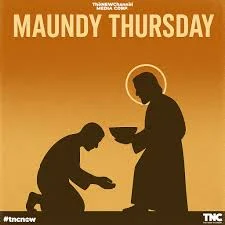Holy Week
MaundyThursday
Passion of Christ Part XIV
Let us awake and prudent to meet our Lord in the watches of the night
On 17th April 2025
Even the disciples couldn't grasp the mystery of Jesus' death on the Cross and resurrection. Peter started rebuking him. Jesus was telling them that he had to suffer and die on the crucifixion, and that on the third day he would be raised from the dead. Even St Peter was perplexed at first by the mystery of dying on the cross. Through Jesus' death and resurrection, the Father revealed to us that He is the Son of God and that we should believe in him. Jesus. We are to see things from a spiritual perspective rather than mere human being. Jesus is very worried about us, and only he knows the depth of the salvation God has prepared for us. Mt 16:21-23 From then onwards Jesus began to make it clear to his disciples that he was destined to go to Jerusalem and suffer grievously at the hands of the elders and chief priests and scribes and to be put to death and to be raised up on the third day. 22 Then, taking him aside ‘Heaven preserves you, Lord,’ he said, ‘this must not happen to you.’ 23 But he turned and said to Peter, ‘Get behind me, Satan! You are an obstacle in my path, because you are thinking not as God thinks but as human beings do.’ The apostles and some of the disciples were accompanied him throughout his mission. Jesus is asking us how well we know him. Jesus mentioned his sacrifice multiple times in order for them to understand the mystery of salvation, as planned by the Heavenly Father. Before Jesus passion he has fulfilled his mission, to preach the Good News to the Israelites and other nations, but he will continue this mission to all the nations through the Apostles and disciples.
John 13:4–8 (NJB): and he got up from table, removed his outer garments and, taking a towel, wrapped it round his waist; 5 he then poured water into a basin and began to wash the disciples’ feet and to wipe them with the towel he was wearing. 6 He came to Simon Peter, who said to him, ‘Lord, are you going to wash my feet?’ 7 Jesus answered, ‘At the moment you do not know what I am doing, but later you will understand.’ 8 ‘Never!’ said Peter. ‘You shall never wash my feet.’ Jesus became the humblest a servant by performing the lowliest service a servant can perform washing his master's feet at his house, where he was assigned to serve. He gave this example to his disciples and to all of us as a reminder of how a leader or servant should treat others.
Luke 22:19–20 (NJB): Then he took bread, and when he had given thanks, he broke it and gave it to them, saying, ‘This is my body given for you; do this in remembrance of me.’ 20 He did the same with the cup after supper, and said, ‘This cup is the new covenant in my blood poured out for you. Jesus established the New Covenant by offering his own blood in the form of wine to the Apostles. The Eucharist was instituted during the Passover Ceremony. But Jesus is obviously mentioned here because He shared His Body and Blood with us in order to create or qualify us for His eternal presence in this world. Receiving Holy Communion makes us one flesh and blood with Him for eternity. How wonderful it is, as Centurion remarked, as we pray and recite in the Holy Mass "Lord, I am not worthy you should enter under my roof but only say the word and my soul shall be healed."
St Augustine said in a reflection on Treatise on Gospel of John: This is surely what we read in the Proverbs of Solomon: If you sit down to eat at the table of a ruler, observe carefully what is set before you; then stretch out your hand, knowing that you must provide the same kind of meal yourself. What is this ruler’s table if not the one at which we receive the Body and Blood of him who laid down his life for us? What does it mean to sit at this table if not to approach it with humility? What does it mean to observe carefully what is set before you if not to meditate devoutly on so great a gift? What does it mean to stretch out one’s hand, knowing that one must provide the same kind of meal oneself, if not what I have just said: as Christ laid down his life for us, so we in our turn ought to lay down our lives for our brothers? This is what the apostle Paul said: Christ suffered for us, leaving us an example, that we might follow in his footsteps.






No comments:
Post a Comment